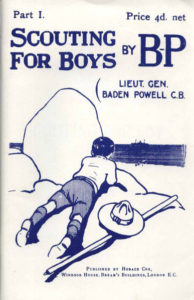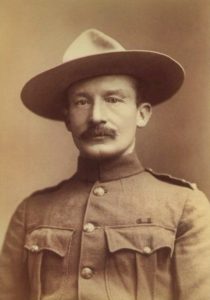Today millions of young boys and girls are members of scouting organizations. It all began with the publication of the book, Scouting for Boys, by Lord Robert Baden-Powell, on January 24, 1908.

Baden-Powell was born in London on February 22, 1857. He spent much of his early life playing in the woods around his home, learning about nature and what was then called wood-craft—how to make-do with the materials that nature provided and how to sustain life away from industrialized society. He wrote that “… in my spare time as a schoolboy I did a good lot of scouting in the woods in the way of snaring rabbits and cooking them, observing birds and tracking animals, and so on.”
Baden-Powell left school and joined the British army, serving in India and South Africa for 34 years. His time in South Africa added to his understanding of nature and survival in the wilderness, while actually performing duties as a military scout. He became famous for his defense of his garrison and the town of Mafeking in the Second Boer War during a 217-day siege over 1899-1900. He returned to England and retired as a Major-General in 1910, a much decorated and renowned war hero.

As his career progressed, he put his extensive knowledge of wood-craft and scouting to work in a series of books. In 1884, he published his first book, called Reconnaissance and Scouting, intended to instruct soldiers and other adults in essential military skills. He published 32 books in all, but the one that started a worldwide phenomenon was Scouting for Boys, that appeared on January 24, 1908.
Scouting for Boys translated Baden-Powell’s knowledge into lessons designed to give boys a taste of adventure and lots of advice for living honorable and satisfying lives. He wrote: “I knew that every true red-blooded boy is keen for adventure and open-air life, and so I wrote this book to show you how it could be done even in a civilized country like England.” The book was an instant success. It taught boys how to interact with nature:
“I have said the ‘hunting’ or ‘going after big game is one of the best things in scouting’. I did not say shooting or killing the game was the best part; for as you get to study animals you get to like them more and more, and you will soon find that you don’t want to kill them for the mere sake of killing.”
It also taught lessons for self-improvement:
“A boy who is accustomed to sleep with his window shut will probably suffer, like many a tenderfoot has done, by catching cold and rheumatism when he first tries sleeping out. The thing is always to sleep with your windows open, summer and winter, and you will never catch cold… A soft bed and too many blankets make a boy dream bad dreams, which weakens him.”
“No boy ever began smoking because he liked it but because he thought it made him look like a grown-up man. As a matter of fact it generally makes him look a little ass.”
Baden-Powell ran an experimental adventure camp for boys in 1907, and the idea caught on. Only two years later, in 1909, he held the first National Scout Rally drawing 11,000 boys. Along with his sister, Agnes, he started a similar group for girls, known in England as Girl Guides. Since then, of course, the organization has gone world-wide. In the U.S. alone, about 2.4 million boys and 1.8 million girls participate in Boy Scouts and Girl Scouts, respectively. Although participation has fallen over the past decade, scouting remains a dominant youth activity in American culture.
And why not? As Robert Baden-Powell said, “Life without adventure would be deadly dull.”
References:
Biography online. Lord Baden-Powell Biography. Available at: https://www.biographyonline.net/humanitarian/baden-powell.html. Accessed January 24, 2018.
Rohrer, Finlo. 2007. What would Baden-Powell do? BBC News, 27July 2007. Available at: http://news.bbc.co.uk/2/hi/uk_news/magazine/6918066.stm. Accessed January 24, 2018.
Scouts. Lord Baden-Powell. Available at: http://scouts.org.uk/about-us/heritage/lord-baden-powell/. Accessed January 24, 2018.
The Guardian. 2013. Baden-Powell’s introduction to Scouting for Boys. Available at: https://www.theguardian.com/books/2013/jul/31/baden-powell-scouts-for-boys. Accessed January 24, 2018.
